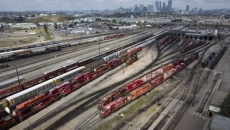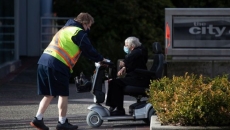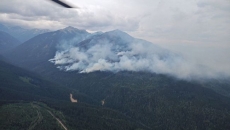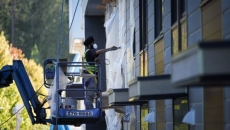B.C. Conservative Leader John Rustad says he has no plan for a user-pays health-care system in British Columbia, after the rival NDP released a recording of him calling the Canada Health Act "silly" for not allowing such a system.
NDP Leader David Eby accused Rustad of planning "American style" user pays, saying he would let people "buy their way to the front of the line."
In the recording of an event that the NDP says happened in August, Rustad can be heard criticizing the Canada Health Act and saying that "hopefully, one day we'll get some changes there."
Rustad says told a news conference in Nanaimo, B.C., that that's "just another lie by the NDP," and the B.C. Conservatives "have not talked about that one little iota."
He says such a model would be "contrary to the Canadian Health Act."
Rustad released his party's costings on Tuesday for a platform that makes no mention of a user-pays health-care model and instead promises a single-payer system delivering care through public and non-governmental facilities.
All three leaders of the province's main political parties converged on Vancouver Island on Wednesday, with record numbers of voters already casting their ballots in advance polling ahead of election day on Saturday.
Elections BC said more than 181,000 people voted on Tuesday — breaking a record set on the first day of voting last week — among 778,000 people who had already cast their ballots ahead of today's final day of advance voting.
Eby told a campaign event earlier in the day, also in Nanaimo, that Rustad presented a risk to the health-care system at a time when the province had a shortage of health-care workers.
"Taking some of those health-care workers and putting them behind a paywall doesn't help," Eby said. "It just means that some people are able to buy their way to the front of the line while you and your family are stuck with less care. It's not a solution."
The NDP has long regarded the island as a stronghold, but Rustad has said he sees it as winnable territory, while both of the Greens' two current seats are on the island.
Eby was travelling the island for campaign events in Ladysmith, Duncan and Victoria, while Rustad was planning an evening campaign rally at a Nanaimo hotel.
On Tuesday, British Columbians finally saw the B.C. Conservatives' platform costings, which Rustad said would result in a deficit nearing $11 billion in the first year of government.
That is more than either the NDP or Greens forecast under their costings, and Rustad said he would balance the books sometime in his second term with help from a predicted 5.4 per cent annual economic growth.
Rustad said his platform would get the provincial economy growing with strategic new spending, the reallocation of wasteful NDP funding to priority areas, and a core review and audit of NDP spending, including a revision of current and planned government capital projects.
He called the NDP's spending "reckless" and said the government had "spent a lot on ideology."
The NDP said Rustad's costings, released four days before election day, meant he would have to "cut supports for people" and he was "making it up as he goes along."
Green Party Leader Sonia Furstenau, who was in Victoria on Wednesday, said that the platform proved the B.C. Conservatives were not "a serious party."
"You have to ask yourself, 'Who do I want representing me, and who do I want making these decisions in this province?' And after the platform released yesterday, I would think that cannot be the B.C. Conservative Party," said Furstenau.
She had earlier said Rustad was relying on "magical thinking" by predicting 5.4 per cent growth, "without any plan on how to achieve this."
BC Stats, the government's statistical office, says B.C. had real GDP growth of 1.6 per cent in 2023.
The NDP and Green platforms would both boost the deficit by about $2.9 billion in the first year, resulting in a $9.6-billion budget shortfall.
The BC Teachers’ Federation and the Canadian Union of Public Employees British Columbia released a joint letter to members on Wednesday, encouraging them to vote NDP.
In the letter, BCTF president Clint Johnston and CUPE BC president Karen Ranalletta say that Rustad has "demonstrated a lack of respect" for the public school system.
“When we look at the platforms of the parties seeking to govern our province, we are encouraged to see three significant commitments in the BC NDP platform that we think are game changers," it said.
This, the letter said, includes Eby's promises of having a full-time counsellor in every school, an education assistant in every K-3 classroom and public delivery of affordable before- and after-school care in every district.






